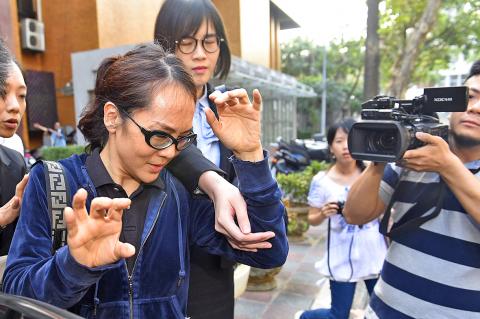The Taipei District Court yesterday began hearings in a case involving former vice president Lien Chan’s (連戰) daughter, Lien Hui-hsin (連惠心), who allegedly publicly insulted a Next Magazine reporter in 2013.
Lien Hui-hsin was indicted for insulting the reporter, surnamed Lee (李), by calling her a “psycho” when Lee attempted to ask Lien Hui-hsin a question about her involvement with a nutritional supplement company whose weight-loss pills were found to contain unauthorized drugs.
Lien Hui-hsin said that the case was a “misunderstanding” and alleged that Next Magazine, in an attempt to force her to settle out of court, had sent her a letter of attestation she felt was threatening.

Photo: George Tsorng, Taipei Times
The Taipei District Prosecutors’ Office said Lien Hui-hsin appeared at the prosecutors’ office in October 2013 as part of an investigation into the Wellslim pills case and was intercepted by Lee as she was visiting the restroom during a break in the questioning.
Lee asked a question about materials printed in the magazine, but Lien allegedly muttered to herself: “What are you talking about?” and “Psycho” before walking back into the room, the office said.
Lien Hui-hsin yesterday told the court that the incident was all a misunderstanding, that she did not know Lee and had not even seen her that night.
Even if she said the word “psycho,” it was in reference to the case during a discussion with her lawyer, and not aimed at Lee personally, Lien Hui-hsin said.
Lien Hui-hsin said Next Magazine had sent letters of attestation for trumped-up charges, saying that if the Lien family did not settle out of court they would “take action” against her then-six-month-old nephew.
Lien Hui-hsin’s lawyer said that the magazine’s offer for an out-of-court settlement was NT$500,000 in reparations, as well the invalidating of an 2006 agreement — in which the magazine agreed to confirm facts with the Liens before reporting anything regarding the family.
Two reporters, surnamed Lu (呂) and Lai (賴), testified in court, but the court considered the claims tainted as both are employees of the Next Media group.

Alain Robert, known as the "French Spider-Man," praised Alex Honnold as exceptionally well-prepared after the US climber completed a free solo ascent of Taipei 101 yesterday. Robert said Honnold's ascent of the 508m-tall skyscraper in just more than one-and-a-half hours without using safety ropes or equipment was a remarkable achievement. "This is my life," he said in an interview conducted in French, adding that he liked the feeling of being "on the edge of danger." The 63-year-old Frenchman climbed Taipei 101 using ropes in December 2004, taking about four hours to reach the top. On a one-to-10 scale of difficulty, Robert said Taipei 101

A preclearance service to facilitate entry for people traveling to select airports in Japan would be available from Thursday next week to Feb. 25 at Taiwan Taoyuan International Airport, Taoyuan International Airport Corp (TIAC) said on Tuesday. The service was first made available to Taiwanese travelers throughout the winter vacation of 2024 and during the Lunar New Year holiday. In addition to flights to the Japanese cities of Hakodate, Asahikawa, Akita, Sendai, Niigata, Okayama, Takamatsu, Kumamoto and Kagoshima, the service would be available to travelers to Kobe and Oita. The service can be accessed by passengers of 15 flight routes operated by

Taiwanese and US defense groups are collaborating to introduce deployable, semi-autonomous manufacturing systems for drones and components in a boost to the nation’s supply chain resilience. Taiwan’s G-Tech Optroelectronics Corp subsidiary GTOC and the US’ Aerkomm Inc on Friday announced an agreement with fellow US-based Firestorm Lab to adopt the latter’s xCell, a technology featuring 3D printers fitted in 6.1m container units. The systems enable aerial platforms and parts to be produced in high volumes from dispersed nodes capable of rapid redeployment, to minimize the risk of enemy strikes and to meet field requirements, they said. Firestorm chief technology officer Ian Muceus said

MORE FALL: An investigation into one of Xi’s key cronies, part of a broader ‘anti-corruption’ drive, indicates that he might have a deep distrust in the military, an expert said China’s latest military purge underscores systemic risks in its shift from collective leadership to sole rule under Chinese President Xi Jinping (習近平), and could disrupt its chain of command and military capabilities, a national security official said yesterday. If decisionmaking within the Chinese Communist Party has become “irrational” under one-man rule, the Taiwan Strait and the regional situation must be approached with extreme caution, given unforeseen risks, they added. The anonymous official made the remarks as China’s Central Military Commission Vice Chairman Zhang Youxia (張又俠) and Joint Staff Department Chief of Staff Liu Zhenli (劉振立) were reportedly being investigated for suspected “serious